“Rest Well, Old Tiger,” Mourn Fans Of Manoj Das
Story-telling is an incredible art and not many people are endowed with this talent. A casanova in the field of story-telling, Manoj Das was a man of substance who enchanted eminent writers like Graham Greene and Ruskin Bond. Unfortunately, after battling with terminal cancer, he passed away at a nursing home in Puducherry on Tuesday (27th April), at 8:15 pm, after being hospitalized for nearly a year at Sri Aurobindo Ashram to which he was associated.

His death has indeed created a void in the world of literature, but he has left behind a treasure of immortal legacy and indelible imprints in the hearts and minds of everyone he touched through his writings. He was the first bilingual Odia writer and a master of dramatic expression both in his English and Odia short stories and novels. He edited ‘The Heritage’, published from Chennai from 1985-1989 and wrote columns in The Times of India, The Hindustan Times, The Hindu and The Statesman as well.
Known for his simple, magical, and impactful writings, Das not only won the hearts of Odisha’s youth, but he also managed to impress eminent novelist Graham Greene, who once predicted, “I have read the stories of Manoj Das with great pleasure. He will certainly take a place on my shelves beside the stories of Narayan. I imagine Odisha is far from Malgudi, but there is the same quality in his stories with perhaps an added mystery.”

His writings revolve mainly around human suffering in the villages of Odisha but he blanketed the misery with such fantasy and satire that it left an indelible impression on the mind of readers. His short stories, novels, essays and poems presented a perfect combination of social realism and understanding of the human psyche and faith. His writings not only offered enlightenment but enjoyment too. It encouraged people to ponder over the harsh realities of life in a lighter tone.
Born on 27th February, 1934 in a small village named Shankari in Balasore district in Odisha, Das etched his name as a child prodigy through his first collection of poems which was published when he was just 14.
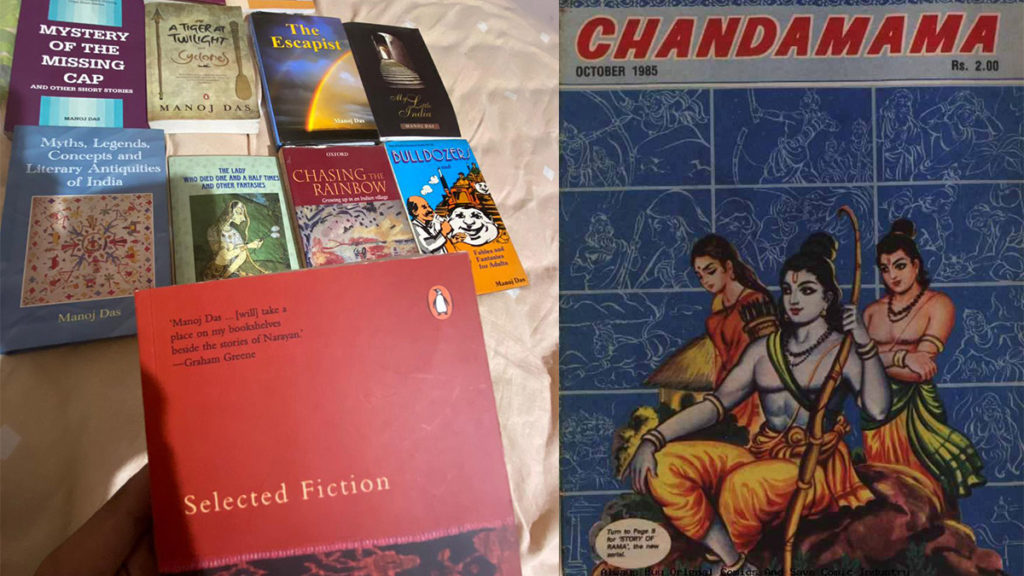
He is well known for his significant contribution to post-Independence Odia literature. He started writing in English in 1968 and some of his well-known works are ‘A Tiger At Twilight’, ‘The Submerged Valley’, ‘The Bridge In The Moonlit Night’, ‘Cyclones’, ‘Mystery Of The Missing Cap’, ‘Myths’, ‘Legends’ and ‘Concepts And Literary Antiquities Of India’. While some of his famous works in Odia are ‘Tandralokara Prahari’, ‘Aakashra Isara’ and ‘Amruta Phala’.
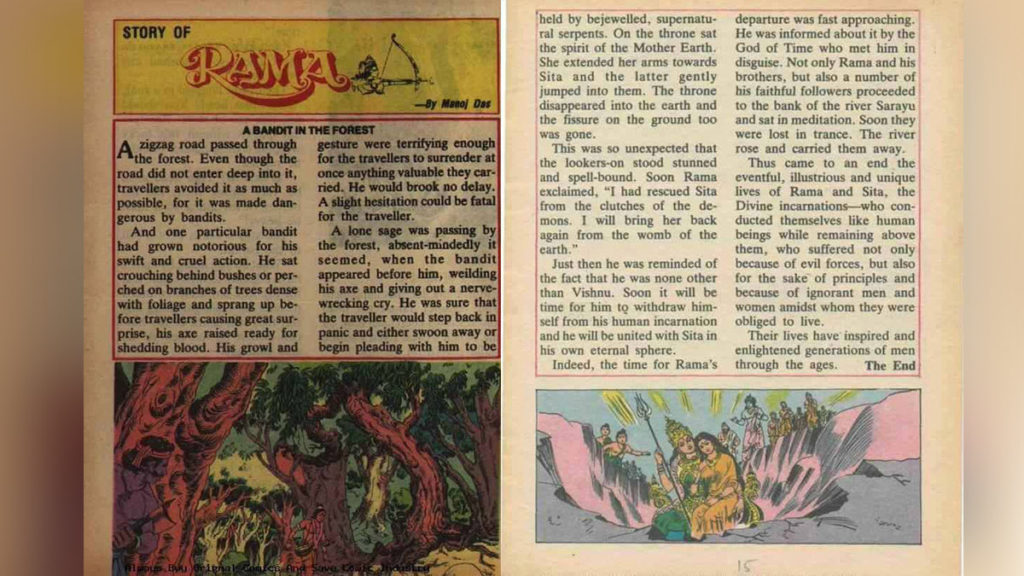
Das, though a native of Odisha, had made Puducherry his home for several decades. He was an eminent Marxist who had turned a mystic and had moved to Sri Aurobindo Ashram in Puducherry in 1963 in search of his inner quest. He even taught at the Sri Aurobindo International Centre of Education, where he penned most of his writings.
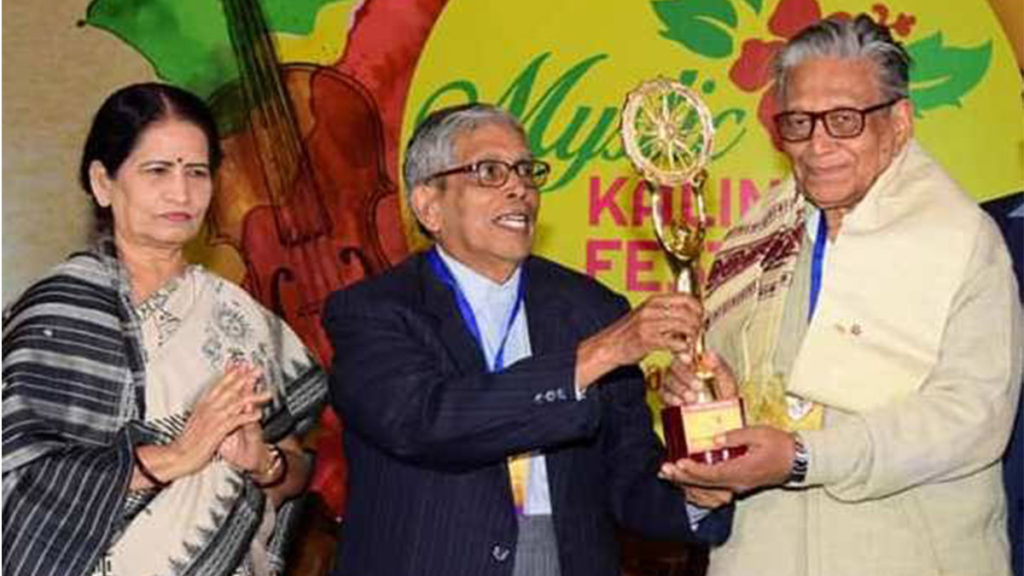
Manoj Das’ writings in Odia and English are noted for its magnificent style, effective use of words and he is rated to be one of India’s best storytellers. He is also a recipient of the Sri Aurobindo Puraskar, Sahitya Akademi Award (1972), Orissa Sahitya Akademi Award, Sarala Award, the Sahitya Bharati Award, and BAPASI (Book-sellers And Publishers Association of South India) and Saraswati Samman in 2000. He was also awarded Padma Shri in 2001, the fourth-highest civilian award in India; Padma Bhusan in 2020, the third highest civilian award in India for his contribution in the field of literature and education.
Das wrote for the most beloved children’s book, Chandamama (English Edition), serially from October 1985 to May 1988. He wrote “Story of Rama”, “Story of Krishna”, “The Saga of Lord Jagannath”, “The Story of Buddha” and ” The Legends of Golden Valley” in Chandamama (English Edition) for years together.
Born and brought up in a family of art-lovers, Samar Pratap Nayak, a self-made ambassador and promoter of Odisha inclusive of all its eminence, recalls meeting Manoj Das as a kid, when he was invited by his mother Sushree Swagatika Patra for lunch back in 1999. “I remember the humble person he was, I asked him, “What do you actually do?” and I received death glares from my entire family, but he politely answered, “I write.” This intrigued me as a kid and I did not really realise the greatness of the person sitting right next to me. Growing up when I read his works and knew about him, I realised how foolish it was of me to not seize the moment and cherish it.”
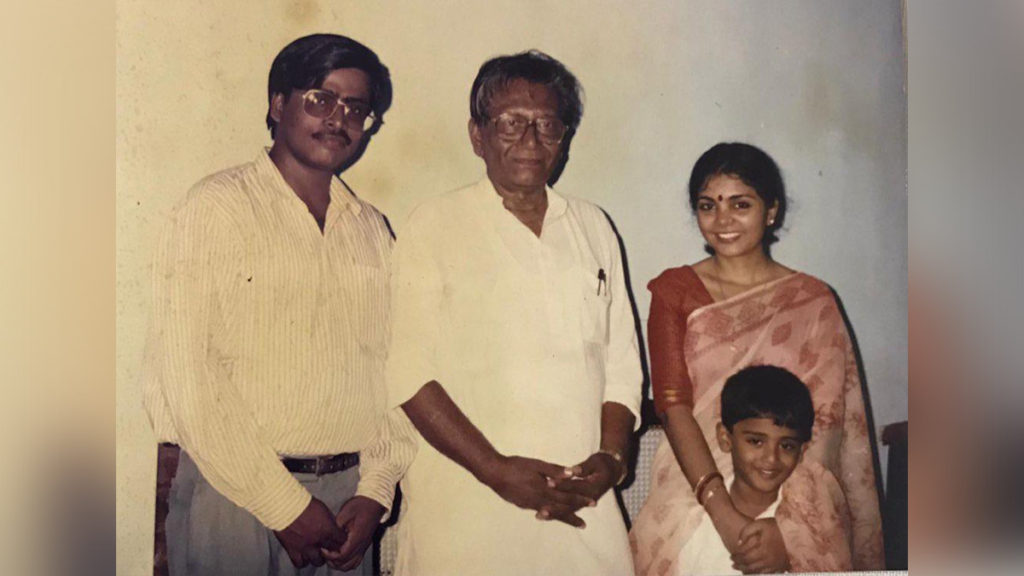
Samar believes that this legendary man did not receive his due credit of being as celebrated as other writers of his age and genre, just because people, mostly Odias, do not popularise and market the fabulous job that he was doing as a writer in and beyond his birth place, Odisha. “We, Odias, tend to remain away from limelight and not aptly publicize our icons and bestow them with the publicity they deserve. Despite his works being far better, we, the people of Odisha, have failed culturally, to critically acclaim the gem of a person and artist that he was. I love his body of work and I can vouch for the fact that it is far better than other writers of his time,” he adds.
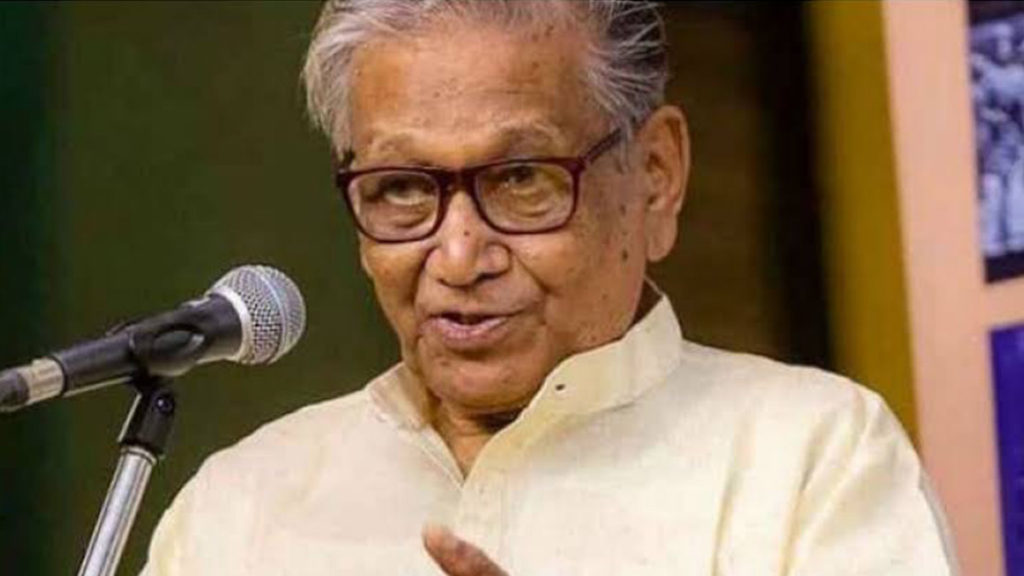
One of the senior inmates of the ashram shared that Das was an extremely learned person who had a strong hold over language and had had a very impactful impression on people. He had influenced many lives by expounding for the world at large, he added.
Das’ cremation is likely to take place on today, 28th April, 2021 observing the Covid protocols. In his condolence message, Naveen Patnaik, Chief Minister of Odisha, tweeted, “Shri Das has left an indelible mark in the field of literature with his vast variety of immortal works and left a void which can never be filled.” The demise of the literary doyen is an irreparable loss to the world of Odia and English literature. My thoughts and prayers with the bereaved family members, readers and followers.
https://mobile.twitter.com/Naveen_Odisha/status/1387070605506138116
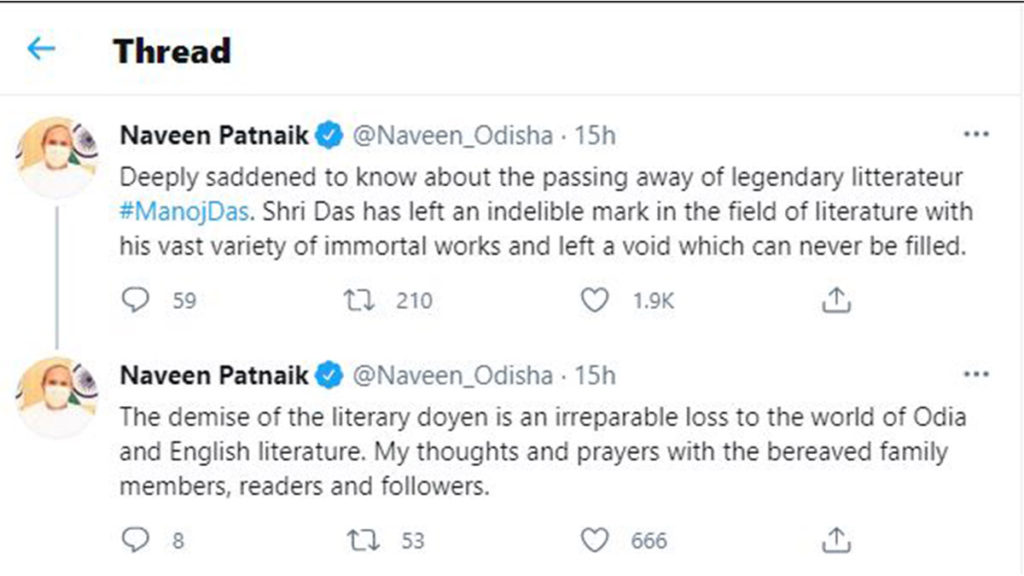
Paying tribute to Das, Prime Minister Narendra Modi said Das distinguished himself as a noted educationist, popular columnist and prolific writer. “He made rich contributions to English and Odia literature. He was a leading exponent of Sri Aurobindo’s philosophy. Pained by his demise. Condolences to his family. Om Shanti,” he tweeted.
https://mobile.twitter.com/narendramodi/status/1387238947013545986
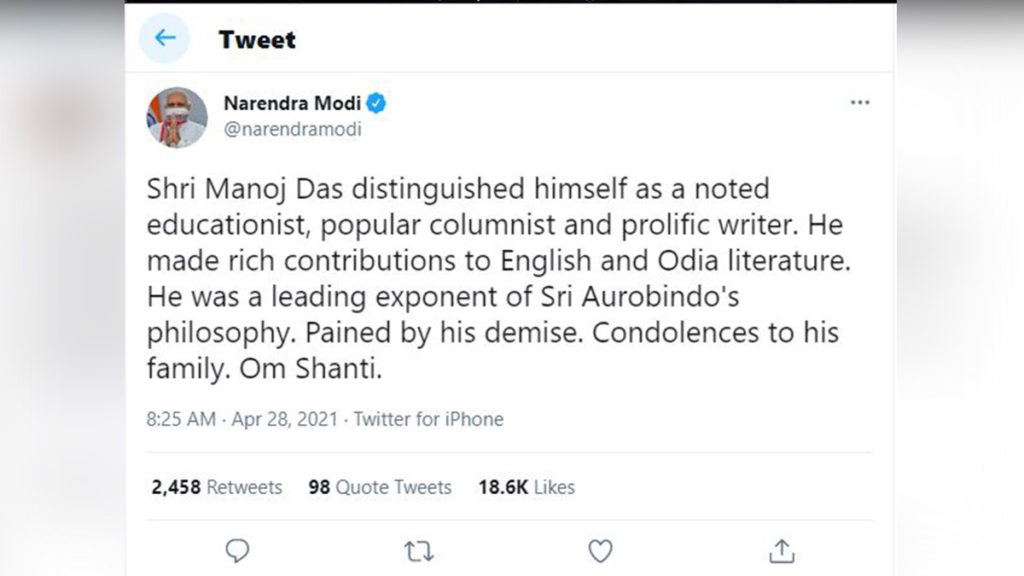
A tweet from Odisha Governor, Ganeshi Lal’s official handle said, “Hon’ble Governor condoles the sad demise of legendary writer and thinker Prof. Manoj Das and conveys his heartfelt sympathy to his family and his readers. He would continue to inspire generations through his timeless literary works.”
https://mobile.twitter.com/GovernorOdisha/status/1387063114533728261
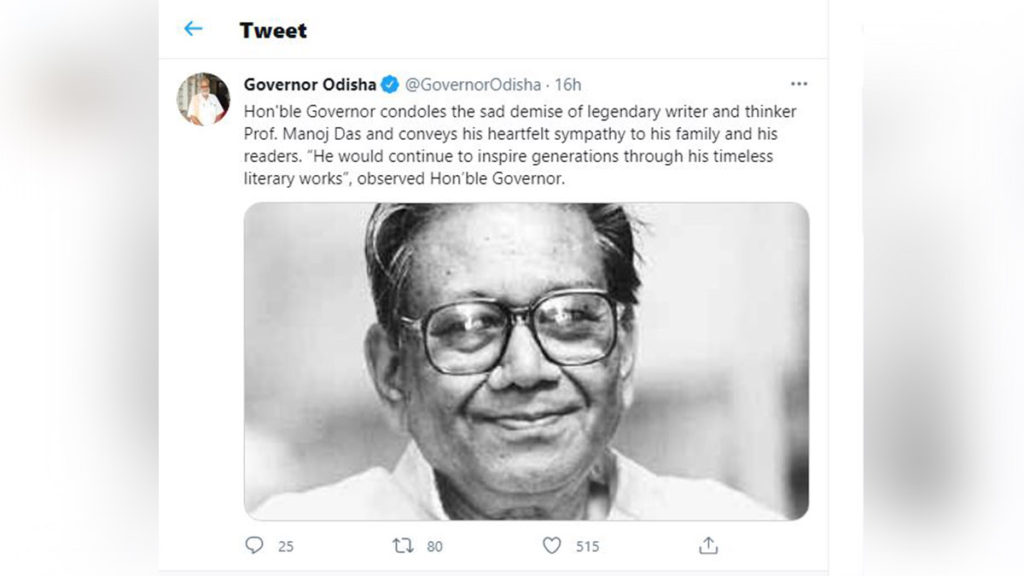
Union Minister Dharmendra Pradhan said Das’ demise has left a void in the literary world. He further added that he had spoken to the Pondicherry Lieutenant Governor and requested that the last rites of the great writer should be performed with national honor.
Manoj Das elevated human experiences through his writings, something that very few writers could master. He will remain alive in the hearts of all the readers who have enjoyed his writings and known him for the sage he had been. Rest well, Old Tiger!

Author: Aafreen Firdaus
Aafreen is a doting mother to several kitties and a doggo who loves to pamper everyone with delicious food. She is a free spirit and a wizard of words and she loves to tell beautiful stories through her writing. She is also a loving and caring soul, always ready to pitch in with a helping hand and a smile on her face.
Read more from author


 copy.jpg)